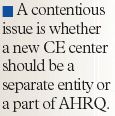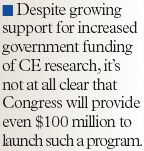- Safety & Recalls
- Regulatory Updates
- Drug Coverage
- COPD
- Cardiovascular
- Obstetrics-Gynecology & Women's Health
- Ophthalmology
- Clinical Pharmacology
- Pediatrics
- Urology
- Pharmacy
- Idiopathic Pulmonary Fibrosis
- Diabetes and Endocrinology
- Allergy, Immunology, and ENT
- Musculoskeletal/Rheumatology
- Respiratory
- Psychiatry and Behavioral Health
- Dermatology
- Oncology
More comparative effectiveness research could be beneficial when assessing new medical treatments
Insurers, payors, and health policy experts are seeking additional evidence that compares the safety, efficacy, and cost of medical products and procedures.

Key Points

For example, legislation to reauthorize the Prescription Drug User Fee Act (PDUFA) and to expand drug safety oversight also strengthens FDA's authority to require postmarket comparative studies on drugs and biologics. Sen Ron Wyden (D–Oregon) has proposed a bill that calls for the elimination of tax deductions for new drug advertisements unless the sponsor conducts studies that compare the drug's effectiveness with the effectiveness of similar agents. Senate Finance Committee chairman Max Baucus (D–Montana) has proposed that the Department of Health and Human Services establish a priority list of clinical studies. The measure originally was included in legislation that would allow the government to negotiate drug prices for the Medicare drug benefit, which has stalled in Congress, but the CE research proposal is likely to resurface in other bills.
SUPPORT FOR CE CENTER

This debate has accelerated since health policy expert Gail Wilensky, PhD, of Project HOPE made the case for a new multibillion-dollar Center for Comparative Effectiveness in an article published in Health Affairs last November. Dr Wilensky suggested the development of an entity with sufficient resources to fund prospective clinical trials on the CE of medical treatments and procedures. This Center would assess alternative therapies and procedures in order to help payors make decisions, but it would not address costs directly, largely for political reasons.
One model for CE enthusiasts is the United Kingdom's National Institute for Health and Clinical Excellence (NICE), a government-funded, independent agency that reviews clinical and outcomes data to compare new medical technologies. The results include cost-effectiveness assessments, which help national health officials make coverage decisions and establish clinical guidelines, but the process often takes more than a year and can delay patient access to new treatments.
FAMILIAR TO FORMULARIES
Additional CE research could help bolster efforts by formulary managers and pharmacy and therapeutics (P&T) committees to consider comparative and economic information when making coverage decisions. Most health plans and pharmacy benefit management companies utilize the guidelines endorsed by the Academy of Managed Care Pharmacy (AMCP). These guidelines suggest that data related to the review of technology assessments and out-
comes and clinical data from safety and efficacy trials conducted to gain FDA approval be included in dossiers submitted to formulary decision-makers.
Formulary committees also can access technology assessment information generated by a number of public and private entities. Oregon's Drug Effectiveness Review Project (DERP) assesses clinical trial data on drug therapeutic groups to inform coverage decisions by managed-care plans and state Medicaid programs. Consumers Union uses the DERP assessments for its BestBuy Drugs program, which factors in drug cost factors for general public use.
New CE initiatives would build on programs managed by the Agency for Healthcare Research and Quality (AHRQ) to provide clinical effectiveness data. AHRQ's current network of research centers reviews medical literature and analyzes available clinical data to formulate recommendations on effective clinical practice. A contentious issue is whether a new CE center should be a separate entity or a part of AHRQ. Even though the Medicare Prescription Drug, Improvement, and Modernization Act of 2003 boosted funding for AHRQ's effectiveness research, the proposed CE center would represent a large and costly expansion.
Coalition promotes important acetaminophen dosing reminders
November 18th 2014It may come as a surprise that each year Americans catch approximately 1 billion colds, and the Centers for Disease Control and Prevention estimates that as many as 20% get the flu. This cold and flu season, 7 in 10 patients will reach for an over-the-counter (OTC) medicine to treat their coughs, stuffy noses, and sniffles. It’s an important time of the year to remind patients to double check their medicine labels so they don’t double up on medicines containing acetaminophen.
Support consumer access to specialty medications through value-based insurance design
June 30th 2014The driving force behind consumer cost-sharing provisions for specialty medications is the acquisition cost and not clinical value. This appears to be true for almost all public and private health plans, says a new report from researchers at the University of Michigan Center for Value-Based Insurance Design (V-BID Center) and the National Pharmaceutical Council (NPC).
Management of antipsychotic medication polypharmacy
June 13th 2013Within our healthcare-driven society, the increase in the identification and diagnosis of mental illnesses has led to a proportional increase in the prescribing of psychotropic medications. The prevalence of mental illnesses and subsequent treatment approaches may employ monotherapy as first-line treatment, but in many cases the use of combination of therapy can occur, leading to polypharmacy.1 Polypharmacy can be defined in several ways but it generally recognized as the use of multiple medications by one patient and the most common definition is the concurrent use of five more medications. The presence of polyharmacy has the potential to contribute to non-compliance, drug-drug interactions, medication errors, adverse events, or poor quality of life.
Medical innovation improves outcomes
June 12th 2013I have been diagnosed with stage 4 cancer of the pancreas, a disease that’s long been considered not just incurable, but almost impossible to treat-a recalcitrant disease that some practitioners feel has given oncology a bad name. I was told my life would be measured in weeks.
